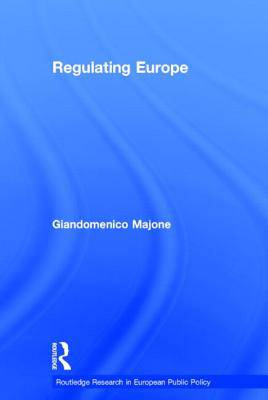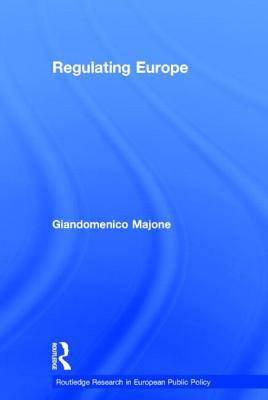
- Afhalen na 1 uur in een winkel met voorraad
- Gratis thuislevering in België vanaf € 30
- Ruim aanbod met 7 miljoen producten
- Afhalen na 1 uur in een winkel met voorraad
- Gratis thuislevering in België vanaf € 30
- Ruim aanbod met 7 miljoen producten
Zoeken
Regulating Europe
€ 202,95
+ 405 punten
Omschrijving
Regulating Europe explains why economic and social regulation is rapidly becoming the new frontier of public policy and public administration in Europe, both at the national and EU levels. Statutory regulation, implemented by independent regulatory bodies, is replacing not only older forms of state intervention but also, to some extent, the redistributive policies of the welfare state. Thus Regulating Europe is an examiniation of the emergence of the regulatory state as the successor of the Keynesian welfare state of the past. Contributions emphasize the parallelism of policy developments at the national and European levels. Part one provides the necessary theoretical background, including a new model of demand and supply of Community regulation. The second part presents a series of case studies of particular regulatory policies and institutions in the UK, Germany, France, Spain and the EU. Part three evaluates current policy and institutional developments, pointing out how the lack of a tradition of statutory regulation in Europe affects the design of the new institutions. Special attention is devoted to the issue of the democratic accountability of expert, politically independent agencies - a problem which, contrary to widespread opinion, is as severe at the national level as it is in Brussels. It is suggested that the requirements of democratic accountability, and of subsidiarity, cannot be met by re-nationalizing European policies, much less by increasing the current level of centralization. A more promising solution is the development of regulatory networks closely integrating national and supranational regulators.
Specificaties
Betrokkenen
- Uitgeverij:
Inhoud
- Aantal bladzijden:
- 332
- Taal:
- Engels
- Reeks:
Eigenschappen
- Productcode (EAN):
- 9780415142953
- Verschijningsdatum:
- 31/10/1996
- Uitvoering:
- Hardcover
- Formaat:
- Genaaid
- Afmetingen:
- 162 mm x 239 mm
- Gewicht:
- 644 g

Alleen bij Standaard Boekhandel
+ 405 punten op je klantenkaart van Standaard Boekhandel
Beoordelingen
We publiceren alleen reviews die voldoen aan de voorwaarden voor reviews. Bekijk onze voorwaarden voor reviews.











